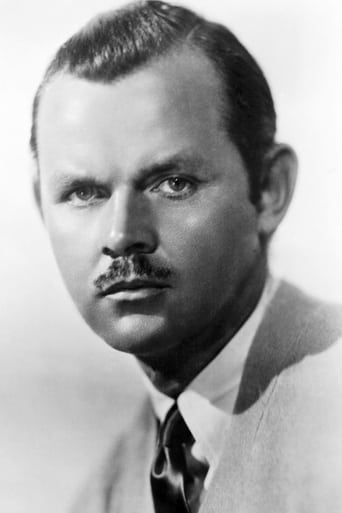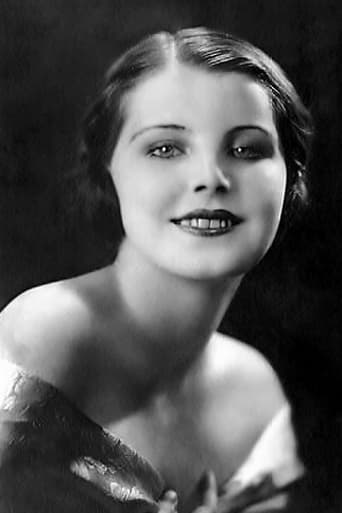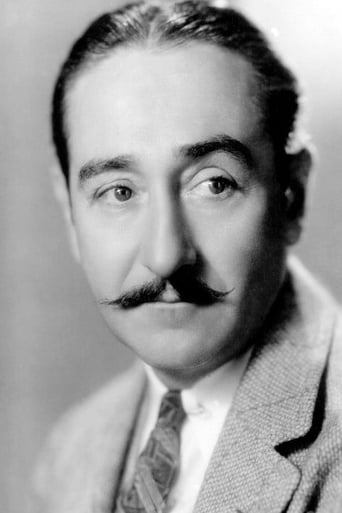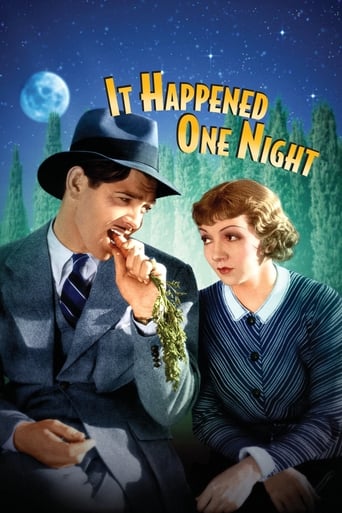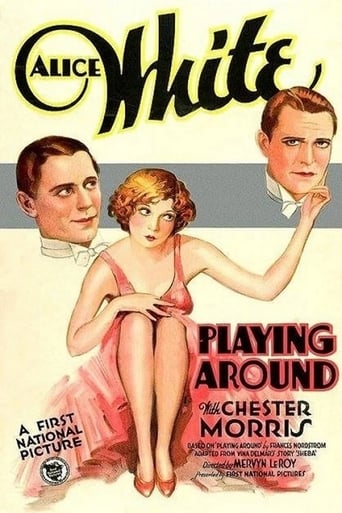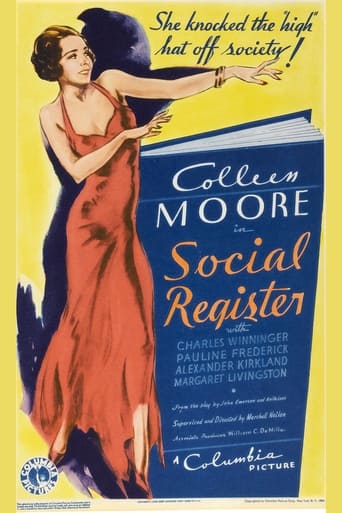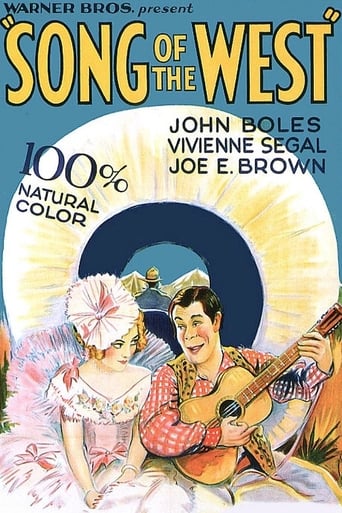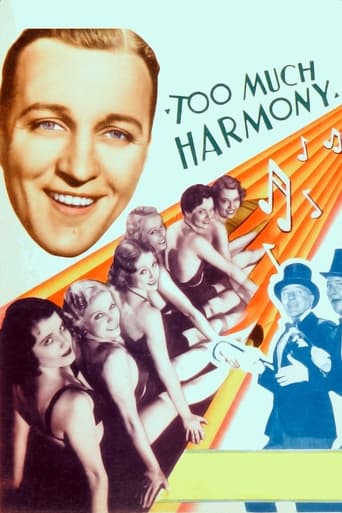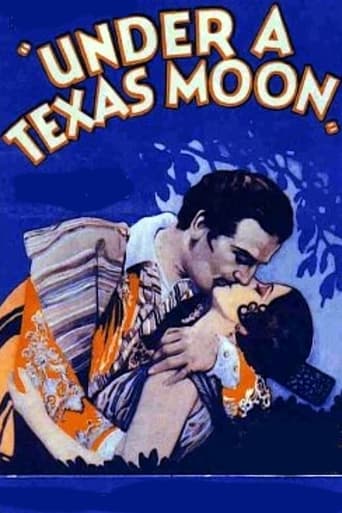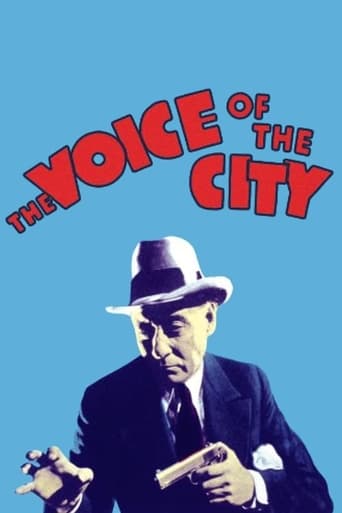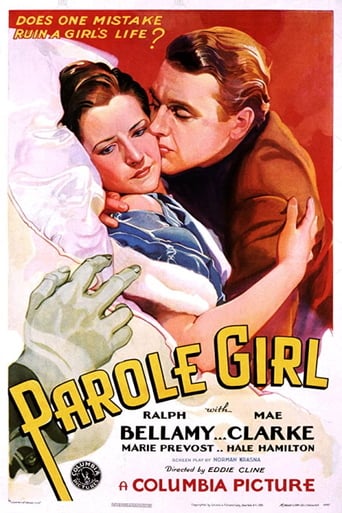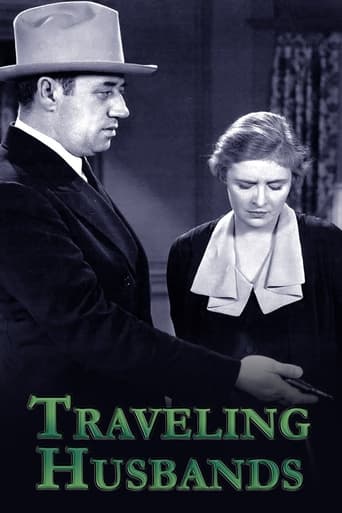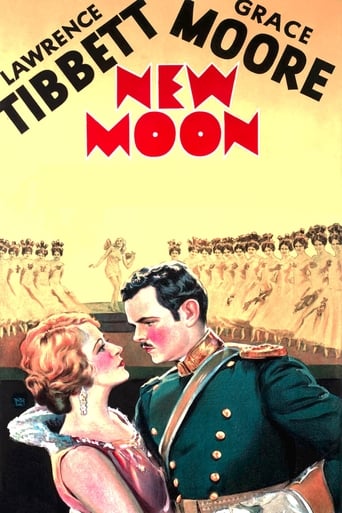

New Moon (1930)
New Moon is the name of the ship crossing the Caspian Sea. A young Lt. Petroff meets the Princess Tanya and they have a ship board romance. Upon arriving at the port of Krasnov, Petroff learns that Tanya is engaged to the old Governor Brusiloff. Petroff, disillusioned, crashes the ball to talk with Tanya. Found by Brusiloff, they invent a story about her lost bracelet. To reward him, and remove him, Brusiloff sends Petroff to the remote, and deadly, Fort Darvaz. Soon, the big battle against overwhelming odds will begin.
Watch Trailer
Cast


Similar titles
Reviews
Very disappointing...
Absolutely the worst movie.
If the ambition is to provide two hours of instantly forgettable, popcorn-munching escapism, it succeeds.
Blistering performances.
1930's New Moon is "New Moon" in name only, but it has two world-famous operatic singers, Lawrence Tibbett and Grace Moore, even if a lot of the songs from the original production were scrapped.MGM moved the story from France to Russia, as evidenced by the opening cossack dance. It reminded me of a New Year's Eve many years ago where a friend of mine, in his cups, leaped into the air, came down on bent knees, arms across his chest and did a cossack dance. The next day he couldn't move.The story concerns a ship, New Moon, going across the Caspian Sea. Lt. Petroff (Tibbett) meets Princess Tanya (Moore) and they fall in love.Petroff learns when they dock in Russia that Tanya is engaged to a governor (Menjou). Long story short, the governor, to reward Petroff for finding a lost bracelet for Tanya (which was just the excuse they used when he found them together), he sends him to a remote fort, where a huge battle is about to take place.I couldn't understand too much of what was being said because the sound was fuzzy, but I have to say the singing was magnificent from both Moore and Tibbett. The 1940 version with Nelson Eddy and Jeannette MacDonald is more the actual "New Moon," including the music. While Eddy also had a beautiful baritone voice, he could accommodate it for the movies, whereas Tibbett used the full power of his voice. Despite this, I prefer Eddy; neither were great actors, but Tibbett looked like Snidley Whiplash from Fractured Fairy tales.Jeanette MacDonald was a better actress than Grace Moore but though she had some beautiful tones, she couldn't touch Grace's singing.Both versions are worth seeing. Softly, As In the Morning Sunrise, which is such a beautiful song, is missing from the 1930 version due to no tenor. In the 1940 version, the tenor and baritone roles were combined into Eddy's part.If you like opera, check this out.
I do like operetta a lot, and I love Lawrence Tibbett not just for his unique voice in that it is powerful whatever register he sings in but also for his vivid and charismatic presence. Of the films he did, New Moon is my personal favourite with Metropolitan not close behind. I agree about the story, it is creaky, hokey and very ridiculous like the story of the operetta except in this case more so, and I also think the movie is too short. However, I do like the production values, especially the costumes, excepting the poorly shot climatic battle. The music is absolutely great, both songs and score, and there is some amusing dialogue and snappy pacing. Roland Young is delightfully droll, and Adolphe Menjou is a fine presence. Then we have Grace Moore, charming yet shrewish, she is my personal favourite of the leading ladies in the films of Lawrence Tibbett. As for Tibbett, aside from the delightful music and sweet romance, with his charisma and wonderful singing, he steals the picture. Overall, I like New Moon a lot, I tend to forget the creaky story, when the music, Moore and Tibbett are so good. 8/10 Bethany Cox
There is no escape from the overt silliness in this stage operetta slapped together by director Jack Conway featuring the magnificent voices of Met opera stars Lawrence Tibbet and Grace Moore. The acting is stiff and the the plot inane but it is easy to forgive when one or both launch into song.Michael Petrov, a Russian officer with a roving eye falls for Princess Strogoff on board The New Moon. She reciprocates but withholds the fact she is engaged to his commanding officer (Adolph Menjou) who sensing the spark between the two sends Petrov off to command a fort on the frontier where the soldiers have a habit of murdering commanding officers. He establishes order by shooting a few malcontents but soon finds the outpost surrounded and grossly outnumbered by the enemy. As tensions mount the princess comes roaring up in a Stutz Bearcat to the front gate to find some closure with Petrov. Like I said, quite silly.Pre-dating the more famous singing sweethearts Nelson Eddy and Jeanette McDonald Tibbet and Moore are their vocal equals and then some. With finer production values, technical improvements, better chemistry and the fact that McDonald was a fine actress, the others just superb singers, everything about New Moon is inferior, but watching the pair sing Wanting You and Lover Come Back to Me is solid gold. It nearly makes up for the ridiculous plot and execution of the film which can be remedied in some way by embracing its unintentional humor.
After New Moon had completed its run of 509 performances on Broadway a year earlier, MGM bought the rights to the film and for reasons known only to Louis B. Mayer and Irving Thalberg scrapped the French colonial New Orleans setting and transferred the story to Tsarist Russia. They realized their mistake and 10 years later filmed it with most of the original story intact with Nelson Eddy and Jeanette MacDonald. It's the version that most know today.The score was also mostly scrapped except for some of the most well known numbers. But what MGM did do was engage two of opera's greatest voices to star in this film, Lawrence Tibbett and Grace Moore.If you were willing to pay some exorbitant ticket prices you could see Tibbett and Moore on the stage of the Metropolitan Opera in any number of productions. Or you could listen to them on the radio and on record where they were some of the biggest classical selling artists of their day. Until Mario Lanza came along, Grace Moore in fact was the biggest classical selling artist.And as I'm a real fan of operetta, hokey plots and all, a film like this is a real treat for the ear. Even Nelson and Jeanette don't sound as good as Larry and Grace singing the Sigmund Romberg-Oscar Hammerstein,II score.The plot is hokey however. Tibbett and Moore meet on a sea voyage, the Caspian Sea where Moore is to marry the provincial governor and Tibbett, an Army lieutenant, to take up a new post. Of course they meet on the ship called The New Moon and fall for each other.When the governor Adolphe Menjou hears of it, he gets Tibbett transferred to the far reaches of the frontier where the savage Turkomen are not real accepting of the Tsar's authority. Menjou's character is Boris Brusilov and he's known in court circles as Bedroom Boris so we know it's his vanity that's hurting not his pride. Still Tibbett insults Moore before taking his leave.But Grace does not like to be scorned. She travels with her uncle Roland Young out to the outpost for the sole purpose of slapping Tibbett with her riding whip. But with the Turkomen closing in, she might pay big time for her little temper tantrum.Of course it's ridiculous, more ridiculous than the original New Moon plot. But the chance to see Tibbett and Moore together is well worth it. Gus Shy even though the plot has changed still plays the same role as sidekick to the hero as he did on the stage version. He's the only one from the original stage production to make it on the screen.Roland Young is as always drolly amusing. He steals every scene he's in. The New Moon is for fans of classical voices and escapist operetta of which there are fewer and fewer unfortunately.


